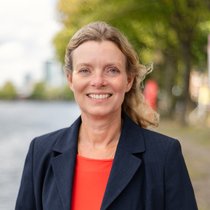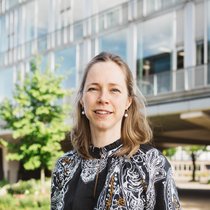According to the new Rathenau Institute report “Four Pioneers for Climate Change" it’s not a solo effort; it’s a complex puzzle pieced together by intermediary organizations like AMS Institute that connect knowledge, practice, and society. Several of these organizations now connect through the newly launched Community of Practice NECTR, fostering exchange, reflection, and mutual learning.
In the complex ecosystem of major societal transitions, notably the climate transition, countless actors are involved: scientists, businesses, policymakers, citizens, and many more. Making meaningful progress requires participation, coordination, collaboration, and translation between these worlds.
As the Rathenau Institute has pointed out in their recent report “Four Pioneers for Climate Change" (see link below), intermediary organizations play a crucial role in this process. They create momentum for change by developing new roles for researchers, stimulating transdisciplinary collaboration, and unlocking existing scientific knowledge for practical use. AMS Institute is proud to be one of four intermediaries featured in the Rathenau report, alongside the Klimaatonderzoek Initiatief Nederland (KIN), Accelerating Circular Economy Zuid-Holland (ACE ZH), and Het Groene Brein. Each plays a unique role in driving sustainability transitions. AMS stands out for deeply integrating science, policy, and real-world citymaking. Reimagining not just what knowledge is produced, but how it’s applied.
Bridging the gap
As the Rathenau report outlines, working as an intermediary creates the conditions for researchers to engage in genuinely transdisciplinary work. Both in practice and with practitioners. These organizations recognize that tackling real-world challenges requires integrating scientific expertise with practical, context-specific knowledge. By addressing complex questions around sustainability transitions in close collaboration with a broad range of societal actors, they challenge traditional models of knowledge production. In doing so, they meet a dual need: researchers eager to make a tangible impact and societal partners seeking knowledge that leads to meaningful, applicable solutions.
Operating at the metropolitan level, AMS Institute embraces the complexity of urban environments and uses the city as a testing ground for innovation.
“We don't just program research; we co-create the city. We’re building new models of collaboration that merge academic rigour with street-level relevance. We’re shaping urban futures, together.”
Zwanet van Lubek
Managing Director
Essential accelerators join forces in NECTR
As the Rathenau report shows, intermediaries like AMS Institute aren’t just nice-to-haves. They are essential accelerators of systemic change. They provide the space to test, fail, rethink, and ultimately transform.
"Cities are our laboratories but also our responsibility. We believe the best ideas are co-created on the street, in the studio, and across sectors. That’s where the future begins.”- Zwanet van Lubek
As the Rathenau report rightly states: “One intermediary organization is, for this reason, never enough. On the contrary, diverse organizations working toward complementary goals need an ecosystem, each addressing their piece of the puzzle.”
AMS Institute fully embraces this perspective. No single actor can solve the complexity of today’s urban and climate challenges alone.
“Only through a rich, interconnected network of organizations, each with its strengths, scale, and focus, can we accelerate the transitions society needs.”
Eveline van Leeuwen
Scientific Director
That is why AMS Institute recently joined NECTR, the Community of Practice (CoP) for Transdisciplinary Work in Transitions. Launched in 2024 by the Climate Research Initiative Netherlands (KIN) and Het Groene Brein, NECTR aims to foster and accelerate transdisciplinary collaboration as a driving force for societal transitions. The community provides a platform for professionals to share knowledge, exchange experiences, and tackle shared challenges, ensuring we continue to learn together as we shape more sustainable futures.
* NECTR is an initiative of NWO, the EWUU alliance (TU/e, WUR, UU, UMC Utrecht), TNO, DRIFT for Transition, the Climate Research Initiative Netherlands (KIN), Rathenau Institute, Athena - Research and Education Institute, Het Groene Brein, the Netherlands Enterprise Agency (RVO), Delft University of Technology, and Convergence (TU Delft-Erasmus MC-EUR).
Curious about the Rathenau report? Read the full report here.
Interested in the Community of Practice NECTR? Have a look at the website here.

